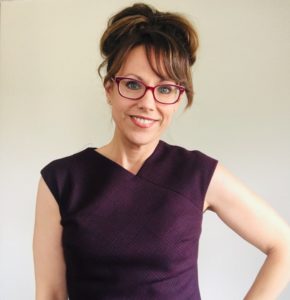A Moment with Sherry Pagoto is part of our interview series featuring thought leaders in research and healthcare. Each interview includes 7 short and stimulating questions.
Dr. Sherry Pagoto is a licensed clinical psychologist, professor, and social media researcher. She is currently a Professor in the Department of Allied Health Sciences at the University of Connecticut and Director of the UConn Center for mHealth and Social Media. She is also the Past-President of the Society of Behavioral Medicine, the leading organization for research at the intersection of behavioral science and health. For more from Dr. Pagoto, find her on Twitter.

1. Tell us something we don’t know. (Anything!)
You have most likely fallen for misinformation online. Everybody is vulnerable even though nobody thinks they are vulnerable. We need to get past this.
2. Which fiction book would you recommend to researchers and innovators in healthcare, and why?
The Alchemist. One of my favorite quotes from it that sticks with me is: “Everything that happens once can never happen again. But everything that happens twice will surely happen a third time.” I think this really speaks to the importance of identifying and intervening upon maladaptive behaviors as soon as possible because giving them a chance to repeat even just once paves the way for that behavior to become a pattern. It also speaks to how many times you should forgive someone for an offense and the answer to that is once.
3. What are you working on right now that you’re excited about?
I am optimizing a behavioral weight loss program that can be delivered entirely in a private Facebook group. Why build a platform when we already have one that has 2.89 billion users many of whom log in daily?
4. Who’s doing something that you admire in healthcare today, and why is it so cool?
I really admire the community-researcher partnership that has arisen out of the long COVID19 Facebook group, Survivor Corps. It is an extraordinary example of how community-based participatory research can occur in online communities to guide and accelerate research addressing the needs of the community. And, it shows how powerful and necessary this is in the midst of a public health crisis.
5. What’s the biggest barrier to getting things done in your line of work?
It takes 9-18 months or longer to get a federal grant funded. And once funded, you are expected to do exactly as proposed. This makes it difficult for behavioral science research to be agile. Consider all that happened in public health in the last 9-18 months!
6. Imagine you win an award for impacting healthcare. What did you do?
This is a tough question! I suspect it would be about expanding how we think about using social media to improve public health.
7. What advice would you give innovators in healthcare?
Listen to patients. REALLY.
About Dr. Pagoto

Dr. Pagoto is a licensed clinical psychologist, professor, and social media researcher. She is currently a Professor in the Department of Allied Health Sciences at the University of Connecticut and Director of the UConn Center for mHealth and Social Media. She is also the Past-President of the Society of Behavioral Medicine, the leading organization for research at the intersection of behavioral science and health.
Dr. Pagoto’s research focuses on leveraging technology in the development and delivery of behavioral interventions targeting diet, physical activity, and cancer prevention. She has developed two mobile apps for weight management and a comprehensive weight loss program that is deliverable via social media platforms.
She has had federal funding for her program of research for 17 consecutive years and has published 200 papers in peer-reviewed journals. She has received several awards for her work including The Obesity Society Pioneer in mHealth/eHealth Award in 2014, Society of Behavioral Medicine Early Career/Young Investigator Award in 2006, and the Western Michigan University Psychology Department Distinguished Alumni Award in 2011.
Devoted to science communication, she has 30k+ followers on Twitter and has contributed to the Washington Post, USA Today, US News and World Report, Chronicle of Higher Education, STAT News, Times Higher Education, MedCityNews, and Psychology Today.